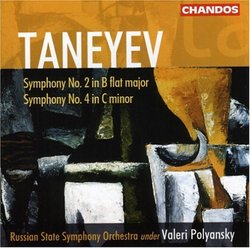| All Artists: Taneyev, Polyanski, Russian State Sym Orch Title: Symphony 2 & 4 Members Wishing: 0 Total Copies: 0 Label: Chandos Release Date: 9/24/2002 Genre: Classical Style: Symphonies Number of Discs: 1 SwapaCD Credits: 1 UPC: 095115999820 |
Search - Taneyev, Polyanski, Russian State Sym Orch :: Symphony 2 & 4
CD Details |
CD ReviewsJustice for Sergey Taneyev? I. J. J. Nieuwland | Amsterdam | 07/03/2003 (4 out of 5 stars) "Polyanski et al. give a more than able rendition of Sergey Taneyev's second and fourth symphonies, proving again the injustice of the iron repertory. These are remarkable, well-crafted and inspired works, on a par and sometimes even transcending those of Taneyev's close friend Tchaikovsky. Certainly, these works are not representative of the sort of generic Russian symphony of the late nineteenth century, although they are traditional in mould. In a way, the second and fourth symphonies stand out at opposite sides of Taneyev's oeuvre, the latter being far more exuberant than the former. Comparison between Taneyev's and Tchaikovsky's fourth symphonies has apparently been inevitable, and astonishingly Taneyev's seems to end on top. For what it is worth, it certainly has one of the most explosive codas ever heard. All through both works, however, Taneyev's preoccupation with counterpoint is noticeable but it never gets in the way of enjoyment. The fourth symphony has experienced somewhat of a revival, with no less than three recent recordings. However, you might want to devote some attention to number two. Written in three movements, this is a muscular piece of music, almost brusque at places. However, you'll be amazed at the unexpected turns that are taken, certainly if you are familiar with the Russian musical language of the period. Comparisons have been made with Bortkiewicz, which is somewhat puzzling given his rather rigid formality - a more fitting comparison, in my opinion, is that which Lyapunov, who shows the same playfulness that Taneyev exhibits, but perhaps not quite the same feeling for melody. This disc compares well to Stephen Gunzenhauser's attempt with the Polish National Orchestra on Marco Polo. The recording is much clearer, 'crisper', than the Marco Polo, but it sometimes borders on the harsh. In my book, the best fourth is still Järvi's (also on Chandos, combined with the excellent Oresteia overture), but Polyansky's forces fare rather better with the second symphony than those of Gunzenhauser. If you have the money, buy this disk and Järvi's - you will not regret it, even with two versions of the fourth. If not, this is a very good starting point." Underrated composer dolcissima2780 | Pennsylvania, USA | 06/18/2003 (5 out of 5 stars) "Taneyev is an amazingly underrated composer. Before the 1980's, he was barely known outside the USSR, yet he was a student of Tchaikovsky. Taneyev's second symphony proves his worth just in the first movement. The entire work attains the power and passion of the Tchaikovsky 5th and 6th symphonies. One can definitly hear the teahcer's influence on Taneyev. There's even a quote from Handel's Hallelujah. Both symphonies are remarkable masterpieces and well worth hearing. I hope to see more Taneyev works on disk. Polyansky and his Russian forces draw the fire and Russian spirit out of both of the works. I hope to see Chandos release more works with this orchestra and conductor. Highly recommended for anyone, especially fans of Russian music!" Appealing Music by a Russian Musical Maverick M. C. Passarella | Lawrenceville, GA | 08/10/2005 (4 out of 5 stars) "The notes to this recording opine that Taneyev makes his strongest musical points in his chamber music, suggesting that the orchestra was not a natural medium for him. This may be true; there is a certain ungainliness about both of these symphonies, but I still like them. In fact, while the Fourth Symphony is clearly more mature and polished, I don't enjoy the Second, especially its finale, any less. This finale is in the best "Russian festival" manner exploited by Russian nationalists like Borodin and Balakirev on the one hand and musical conservatives like Rubinstein and Tchaikovsky on the other. It swaggers along in an off-kilter sort of way, a function of both the thematic material and the orchestration, which the notes say have an "archaic" cut to them in the manner of Glinka. Whatever, this is quite attractive music in a bearish sort of way.
In the Fourth Symphony, the first movement impresses most, I think, with its motivic energy and strong compositional logic; Taneyev's debt to his musical mentor Tchaikovsky is clear in this respect alone. (The older composer's influence is much more obvious in the Second Symphony, which starts with an almost direct quote from "Romeo and Juliet.") Otherwise, the strange melodies, the dark orchestral colors, the harmonic sophistication are pure Taneyev. But then the slow movement has a serenity one would hardly expect from this composer, whose fast movements are usually given to noisiness. Taneyev lightens up a bit for the intriguing Scherzo, which sounds like Anton Rubinstein on a really, really good day! The finale is somewhat blustery, and the recasting of the waltz melody from the first movement as the heroic theme of the movement's peroration is not, to me, as convincing as it is to some writers; I don't really buy the triumph-to-tragedy program of this movement. However, it makes a suitably grand noise in the coda, and along the way there are some interesting foretastes of Gliere and Rachmanioff. Overall, then, this is an interesting and often moving symphony. The performances here are a little rough-hewn, which matches the music well, I think. Maybe "brash" is a better description, and that certainly characterizes the very Russian brass playing. At times, it's almost raucous. In truth, critics have been somewhat divided over the performances; I agree with those who think Polyansky's big-scale, heart-on-sleeve approach is the right one to help this music leap off the page. The recording--exciting but a trifle raw--matches the interpretations exactly." |

